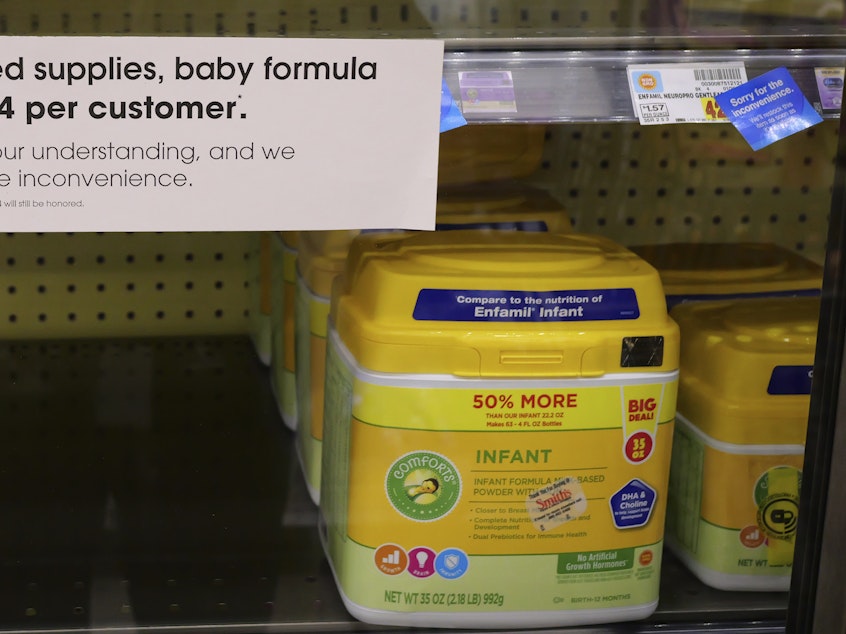White House bolsters efforts to get baby formula into the hands of WIC recipients

As the national shortage persists, the White House says states have been asked to boost accessibility of baby formula for WIC recipients. And the Food and Drug Administration said it is looking at ways to make it easier to import baby formula.
The federal WIC program, which stands for Special Supplemental Nutrition Program for Women, Infants, and Children, provides grants to states to support low-income postpartum and pregnant women, as well as infants and children as old as 5 who are at a nutritional risk.
The shortage follows Abbott's voluntarily recall of some powdered baby formulas in February, after four infants were hospitalized with bacterial infections.
Abbott holds an expanse of contracts in the WIC program with "states, territories and tribes" that make up nearly half of all infants on the program, according to a letter to from Secretary of Agriculture Tom Vilsack to Abbott CEO Robert Ford.
In the letter dated Friday, Vilsack urged Abbott to take further action to support WIC recipients.
Sponsored
White House press secretary Jen Psaki said Abbott had committed to providing states with rebates through the end of August, which will allow states to buy supply ahead of time from a variety of manufacturers, rather than just the ones with which they have contracts.
"This means that families on WIC can purchase any available product in the months to come through August and states and retailers can plan ahead," Psaki said.
Vilsack also sent a letter to states Friday afternoon, urging the adoption of all flexibilities in the WIC program, Psaki said. States were asked the same in February, she added, but not all states made the adjustment.
Next week, the U.S. House will consider a bill to grant "emergency authority to the WIC program to address supply chain disruptions and recalls," House Speaker Nancy Pelosi, D-Calif., said Friday in a message to lawmakers. That will let the government "relax certain non-safety-related regulations," she said.
Pelosi also announced plans to consider an emergency appropriation "to immediately address the infant formula shortage."
Sponsored
Beyond the WIC program, Psaki said, President Biden has spoken to formula retailers and manufacturers to understand how they can increase availability.
The FDA is also taking steps to improve supply
Also on Friday, Dr. Robert Califf, the Food and Drug Administration's commissioner, said the agency is working to bring "as much infant formula to US shelves as quickly as possible."
He called it a "top priority" in a tweet on Friday.
Califf said the FDA plans to announce plans next week that define how suppliers and manufacturers outside of the U.S. will bring products to America. The agency will ensure the products are safe and appropriately labeled, he added.
Sponsored
The FDA is also working with manufacturers in the U.S. market, such as Mead Johnson/Reckitt and Nestlé/Gerber, to increase formula production, including for specialty products.
The average out-of-stock rate for baby formula at retailers across the country was 43% in early May, according to data from the firm Datasembly.
"We believe these and other ongoing efforts will help dramatically improve the supply in the U.S. in a matter of weeks," Califf said. "Our data indicates that in stock rates in retail stores are stabilizing but we continue to work around the clock to further increase availability."
Parents can visit the U.S. Department of Health & Human Services website for more information if they cannot find formula, Psaki said.
"This work is far from over," she added. [Copyright 2022 NPR]



